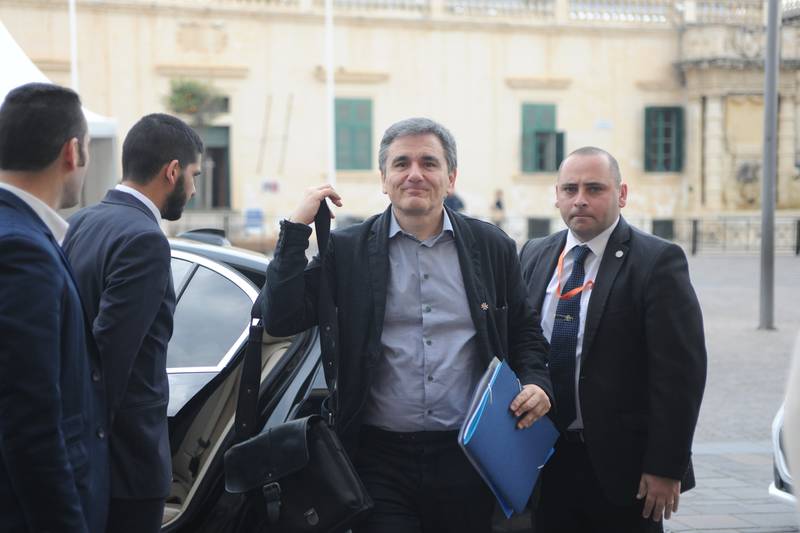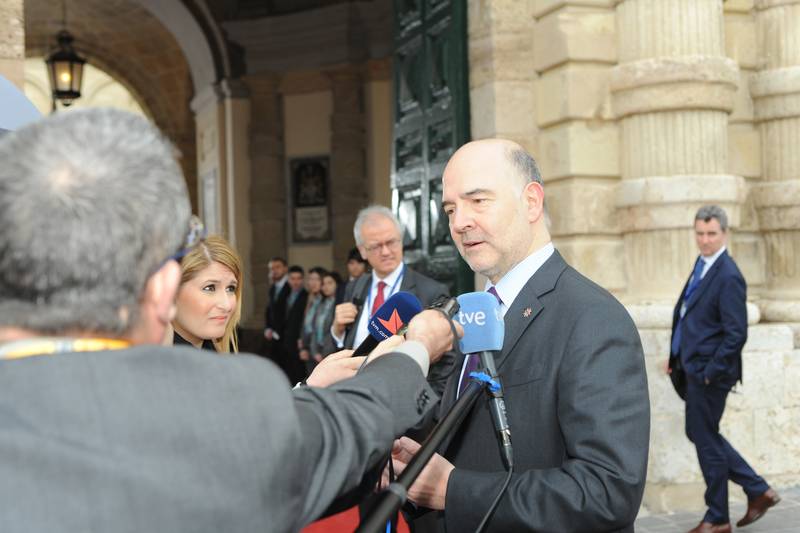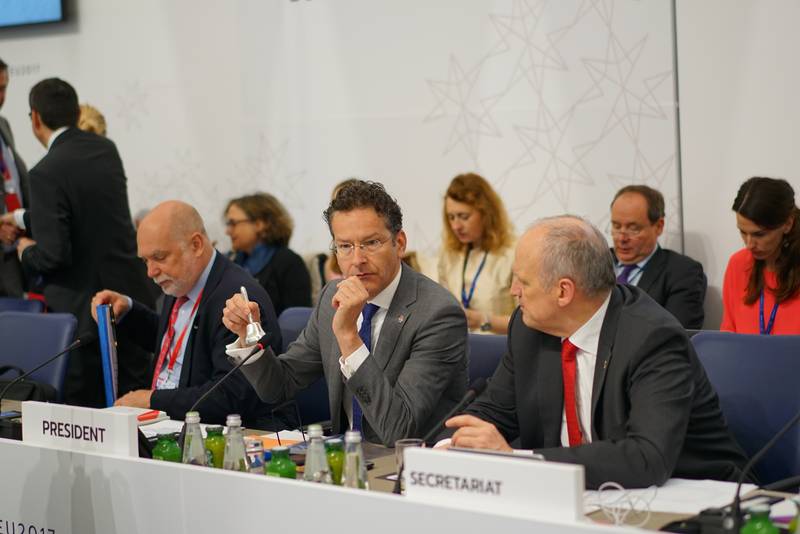Could Greece Really Turn the Page?
Adelina Marini, April 11, 2017
 Will Greece manage to complete its bailout programme this time? This is the question that is hovering in the air after on April 7 the Eurogroup agreed in principle on the fiscal and reformist path of Greece after the programme expires next year. Since February, the Greek news from the meetings of finance ministers of the euro area have been creating expectations that this time there might be a breakthrough, after last autumn's stall of the implementation of the third rescue programme, agreed on in August 2015 to an amount of 86 billion euro. Details on what was agreed on last Friday are scarce as the deal has not yet been "dressed" in a written agreement. This will happen when representatives of the institutions (formerly the Troika) return to Athens, and this, according to the Ekathimerini newspaper, is expected to happen in late April.
Will Greece manage to complete its bailout programme this time? This is the question that is hovering in the air after on April 7 the Eurogroup agreed in principle on the fiscal and reformist path of Greece after the programme expires next year. Since February, the Greek news from the meetings of finance ministers of the euro area have been creating expectations that this time there might be a breakthrough, after last autumn's stall of the implementation of the third rescue programme, agreed on in August 2015 to an amount of 86 billion euro. Details on what was agreed on last Friday are scarce as the deal has not yet been "dressed" in a written agreement. This will happen when representatives of the institutions (formerly the Troika) return to Athens, and this, according to the Ekathimerini newspaper, is expected to happen in late April.
Eurogroup boss Jeroen Dijsselbloem (Netherlands, Socialists and Democrats) said at a press conference after the meeting on Friday that a reform package worth 2% of GDP was agreed on, which refers to the period after the completion of the programme in 2018. The Greek government is committed to reduce government spending by 1% of GDP in 2019, the main focus being on the pension system. The pension reform, which includes reduction of pensions, eliminating benefits, and increasing retirement age, is one of the two most problematic issues in the current Greece bailout programme. In 2020 the government will have to cut another 1% of GDP costs, this time the focus being on personal income tax.
Time for dessert
When representatives of the institutions and the Greek government sign the agreement, that would also clear the way for the "reward" for Greece's serious reform efforts, and that is starting talks on a debt relief. Jeroen Dijsselbloem stated that the biggest hurdles have already been overcome and the Eurogroup will be able to deal with the medium-term fiscal path for the period after the end of the programme as well as the sustainability of debt. The two things are inextricably linked and there is still no agreement on them between the euro area and the International Monetary Fund. IMF and Brussels differ significantly in their understanding of the results of Greece's bailout programme on the sustainability of its public debt and what fiscal path should be followed in the medium term to allow the debt to be sustainable and to move towards its reduction.
These differences are the reason the IMF has not yet participated in the programme. Based on his own analysis, the Fund believes that the set targets to generate a primary budget surplus (excluding payments on loans) from 1.75% this year, 3.5% next year, and 3.5% in the medium term are not realistic in order to lead to debt sustainability. Furthermore, the Fund believes that it can not be expected of Greece to maintain high primary budget surpluses (averaging 3.5%) for too long after the closing of the programme, and therefore demands that debt relief is agreed on. There is agreement on this maturing in the euro area already, but the question remains what form will this debt relief have.
EU Economic Affairs Commissioner Pierre Moscovici (France, Socialists & Democrats) stated that Greece has achieved a surprising primary budget surplus of 3% last year, which was at least 6 times greater than the objective. This year, Greece is expected to reach 1.75% budget surplus and 3.5% next year. Earlier, during a debate in the European Parliament on the Greek rescue programme Mr Moscovici acknowledged that this goal cannot be pursued too long. "It is not democratic", he said. However, he stressed the need for Greece to record primary surpluses over the medium term. "We've been saying for a long time that a more realistic budgetary surplus target is necessary after the programme. We will not get reasonable market lending otherwise", he remarked, but did not say how large these surpluses need to be.
He added that Greece has surprised everyone with its economic performance last year. According to the winter forecast of the European Commission, economic growth in Greece was 0.3% in 2016 and is expected to be 2.7% this year. Pierre Moscovici expressed confidence in front of the MEPs that due to significant reforms and good economic performance, Greece will manage to turn the page. So far, more than 200 measures have been adopted since the start of the programme, which is a huge effort. Benoît Cœuré, a member of the executive board of the European Central Bank, said the deal signed on Friday gives grounds to  starting talks on the sustainability of the Greek debt, which means also negotiating debt relief. He stressed that time is of the essence.
starting talks on the sustainability of the Greek debt, which means also negotiating debt relief. He stressed that time is of the essence.
Jeroen Dijsselbloem also agreed with this, saying there have already been too many delays. "The Greek economy in the 1st half of last year was picking up and that momentum is slipping away from us. So, we really need to work fast and have it done certainly well in time for the next payments", said the head of the Eurogroup. The next tranche under the programme must be paid in July. The biggest obstacle on the subject of the Greek debt is Germany. The position of Chancellor Angela Merkel is against debt write-off. This will be one of the main topics of discussion in Berlin on Tuesday (April 11)between her and the head of the IMF Christine Lagarde. The outcome of these discussions and Germany's decision is hanging to a great extent on the parliamentary elections this fall. Mrs Merkel's government is seriously threatened by the emergence of a new candidate of the Social Democrats - former head of the European Parliament Martin Schulz, who has always supported the write-off of Greek debt, but the theme is toxic to German society.
Greece is no longer so important
Whether because the end to the Greek saga is now in sight, or because eight years are too long, but the boss of the European Stability Mechanism (the euro area's permanent bailout fund), Klaus Regling, made a surprise statement at the press conference following the Eurogroup on 7 April. Usually, after Eurogroup meetings, he explains how much money has been allocated so far to Greece and sends messages to the Greek government to adhere to its commitments. This time, however, he reacted in an unusual manner. Instead of starting with Greece, especially after it became clear that an important agreement has been reached, he spoke about how important the other two topics on the agenda of the meeting of finance ministers of the euro area were - how to boost investment and how to improve the functioning of the banking system.
In his words, these two topics are essential for the long-term functioning of the euro area. "But, of course, Greece is important. We tend to talk about primary surpluses these days, but I think in other countries people look more at the overall fiscal balance", he said at a joint press conference in Malta.
For the scalp of Jeroen Dijsselbloem
Elections in the Netherlands forced over the last few weeks the discussion about a successor to Eurogroup Chairman Jeroen Dijsselbloem. This was also one of the main journalists' questions at the March Eurogroup, which took place in late March. Back then, the mood was one of full support for Mr Dijsselbloem and confidence that not only will he finish his term (which expires in January), but it is possible that he wins a second term. For the two weeks between the March and the April meetings of the Eurogroup many things have changed. The first is that the Labour Party (PvdA), of which Jeroen Dijsselbloem is a member, lost the elections catastrophically. That was the biggest piece of news from the vote in the Netherlands in late March. The party lost 29 seats and is left with only nine members or parliament, which makes the remaining of Mr Jeroen Dijsselbloem as minister of finance unlikely.
The second change came because of Dijsselbloem himself, who undermined his already slim chances of staying in office. In an interview with the German financial daily Frankfurter Allgemeine Zeitung, he used words that sparked a huge scandal in the southern periphery of the euro area. According to him, one cannot spend their money on alcohol and women and then expect solidarity. Besides from some southern capitals, sharp reactions also came from the European Parliament. Its President Antonio Tajani (EPP, Italy) and a group of MEPs condemned the remarks and demanded that Dijsselbloem attends a hearing in plenary. The Dutch finance minister refused attendance by pointing out that the date (April 4) is busy in his calendar. He also recalled that he was quite recently interviewed in the economic committee of the European Parliament.
During the otherwise filled with populist rhetoric discussion, in which specific comments on the parameters of the Greece bailout programme and the country's future after the end of it were sporadic, MEPs condemned the statement of the head of the Eurogroup and demanded an apology. A few days later, during the meeting of euro area finance ministers in Malta, Jeroen Dijsselbloem apologised to his colleagues as well. He said he himself had raised the question and expressed regret for his choice of words, repeating that he had no intention of offending anyone. He stressed, however, that in order to have solidarity, it is important to respect the arrangements and promises. "The choice of words has regretfully caused pain for people and that ,of course, I regret very much".
 In his words, no discussion followed and nobody asked for his resignation. It is not clear so far whether Jeroen Dijsselbloem is going to finish his term in office. It depends on the duration of negotiations on forming a new government in the Netherlands, since the rules of the Eurogroup state that its leader must be a minister in office. It is possible there will be a gap between negotiations and the end of his term (January), but it is still not clear how it will be filled. In March, some of his colleagues said that this is the preferred option, namely because of Greece, as Mr Dijsselbloem is far too familiar with the Greek dossier. The appearance of someone, who has yet to get acquainted with the situation in detail, particularly in a key moment for the programme, is not to the taste of some of the ministers.
In his words, no discussion followed and nobody asked for his resignation. It is not clear so far whether Jeroen Dijsselbloem is going to finish his term in office. It depends on the duration of negotiations on forming a new government in the Netherlands, since the rules of the Eurogroup state that its leader must be a minister in office. It is possible there will be a gap between negotiations and the end of his term (January), but it is still not clear how it will be filled. In March, some of his colleagues said that this is the preferred option, namely because of Greece, as Mr Dijsselbloem is far too familiar with the Greek dossier. The appearance of someone, who has yet to get acquainted with the situation in detail, particularly in a key moment for the programme, is not to the taste of some of the ministers.
Dijsselbloem himself said in response to a journalist's question, that he did not intend to break the tradition of careful selection and preparation of his successor. Ultimately, the post is not reserved for the minister of finance of the Netherlands. There are candidates for his seat already, the most prominent of whom is Spanish Finance Minister Luis de Guindos, who hoped last time to get the job, but lost it to Jeroen Dijsselbloem. The other candidate is Slovak Finance Minister Peter Kažimír. Other names are also mentioned. None of the Eurogroup ministers wished to comment on the topic of Jeroen Dijsselbloem's resignation before or after the meeting of the Eurogroup, except Austrian Hans Jörg Schelling, who answered a question whether Jeroen Dijsselbloem should resign with a laconic "no".
Translated by Stanimir Stoev
 Klaus Regling | © Council of the EU
Klaus Regling | © Council of the EU Mario Centeno | © Council of the EU
Mario Centeno | © Council of the EU Mario Centeno | © Council of the EU
Mario Centeno | © Council of the EU